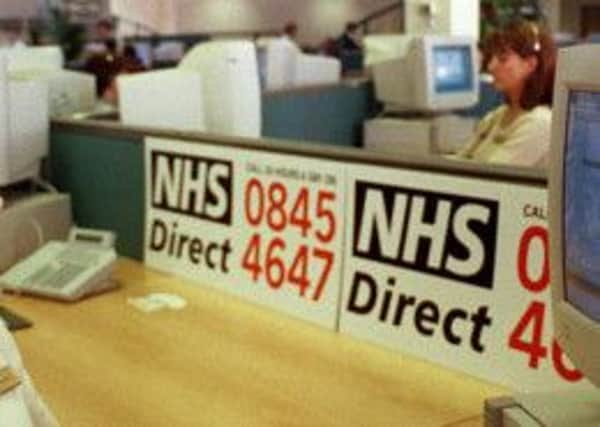NHS 111 helpline ‘plunged into chaos’ as key operator pulls out


NHS Direct provides the non-emergency phone line in nine regions of England but has said that it is “seeking to withdraw” from the contracts it entered into.
A spokeswoman said the contracts, which cover more than a third of England’s population, were “financially unsustainable”, triggering warning from unions that some parts of the service were in chaos.
Advertisement
Hide AdAdvertisement
Hide AdThe NHS 111 line, which coalition Ministers decided should replace NHS Direct as the number to call for urgent but non-emergency care, has been riddled with controversy.
The line suffered teething problems, with patients complaining of calls going unanswered, poor advice and calls being diverted to the wrong part of the country.
In Yorkshire, where the service is provided by Yorkshire Ambulance Service, the full launch only took place earlier this month owing to capacity problems, although the service has not been beset by the kind of difficulties in some other parts of the country which prompted NHS England to launch an investigation after a number of potentially serious incidents, including three deaths.
NHS Direct originally won 11 of the 46 contracts across England to provide the 111 service. Its bid in Yorkshire was unsuccessful.
Advertisement
Hide AdAdvertisement
Hide AdEarlier this month it announced it would be unable to provide the service in North Essex and Cornwall. But now it is also planning to stop providing the service in Somerset, Buckinghamshire, east London and the City, south east London, Sutton and Merton, West Midlands, Lancashire and Cumbria, Greater Manchester, Merseyside and Cheshire.
It said it was preparing for a “planned withdrawal” from the contracts after projecting a £26m deficit for the coming financial year.
NHS England deputy chief executive Dame Barbara Hakin said: “We are also having constructive discussions with a number of potential new providers who could take on these contracts, specifically with the local ambulance trusts who have experience and a strong track record in provision of similar services.”
Earlier this month, the Health Select Committee criticised ministers for the “premature” roll-out of the 111 service.
Advertisement
Hide AdAdvertisement
Hide AdA spokesman for Prime Minister David Cameron conceded there had been problems with its implementation, but insisted performance and patient satisfaction was now high.
“He is confident that we will continue to push up standards and deliver a high level of service for patients across the country,” the spokesman said.
But Chaand Nagpaul, chairman of the British Medical Association’s GP committee, said: “The implementation and planning of NHS 111 has been an abject failure. The decision by NHS Direct to seek a withdrawal from its contracts to provide NHS 111 reveals worrying flaws not just with the tendering process for NHS 111 contracts, but for how contracts are awarded and monitored throughout the NHS.”
Peter Carter, of the Royal College of Nursing, said: “This latest announcement raises concerns that a locally-commissioned, fragmented system may simply not be able to provide the high standard of service and advice that patients need. Despite the best efforts of their staff, some parts of the NHS 111 service are now in chaos, and urgent action is needed to prevent this from having tragic consequences for patients.”
Advertisement
Hide AdAdvertisement
Hide AdLatest figures reveal the Yorkshire 111 service is dealing with around 75,000 calls a month.
The longest wait for a call to be answered in June was 19 minutes and the longest wait for a call back from a clinician was nearly nine hours. Around eight per cent of calls led to an ambulance being dispatched and seven per cent of patients were advised to go to A&E – both are said to be within the target range.
Yorkshire Ambulance Service said: “Our NHS 111 service is relatively new and, at this stage, we are assured that it is performing well.”